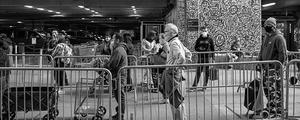WASHINGTON, D.C. -- With healthcare legislation hanging in the political balance, Gallup-Healthways Well-Being Index data find an increasing number of Americans are relying on government-based health insurance, while fewer are getting coverage through an employer. The percentage of Americans with Medicaid, Medicare, or military/veterans' coverage increased to an average of 24.6% last year, from 23.3% in the year prior. The percentage with employer-based healthcare dropped to an average of 46.8% in 2009, from 49.2% in 2008. Also, as Gallup reported previously, more Americans went uninsured in 2009 than was in 2008.
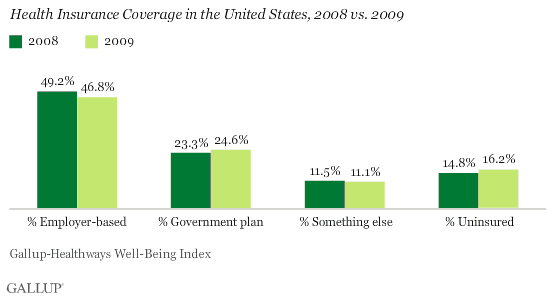
Gallup and Healthways ask approximately 1,000 Americans each day if they have health insurance. Respondents who say that they do have health insurance are then asked if they get their primary health coverage through an employer or union, Medicare, Medicaid, military/veterans' coverage, or through something else.
Snapshot of the Insured
Monthly averages reveal that among Americans who report that they are insured, the percentage with Medicaid, Medicare, or military/veterans' coverage increased fairly steadily from January of 2008 to December of 2009, while those with employer-based health insurance declined over that period.
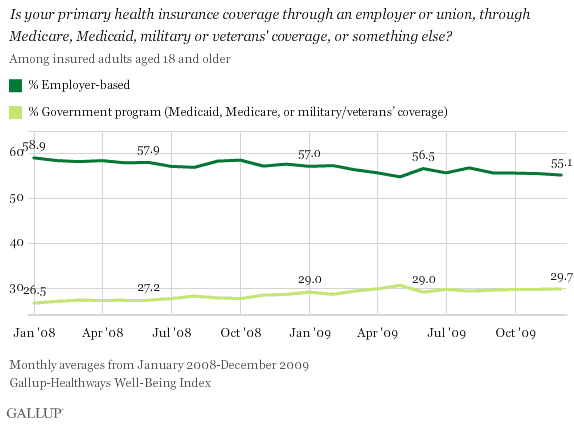
As would be expected, there is a distinct difference in health insurance type by age as Americans aged 65 and older qualify for Medicare. More than three-quarters of insured seniors report that they get their health coverage through a government plan (Medicare, Medicaid, or military/veterans' benefits). The majority of Americans aged 18 to 64 who have health insurance are covered through their employer or union. This number however declined slightly last year, as did the percentage of elderly Americans reporting employer-based health coverage. At the same time, the percentage of 18- to 64-year-olds reliant on a government plan for their healthcare increased somewhat from 14.5% in 2008 to 15.7% in 2009.
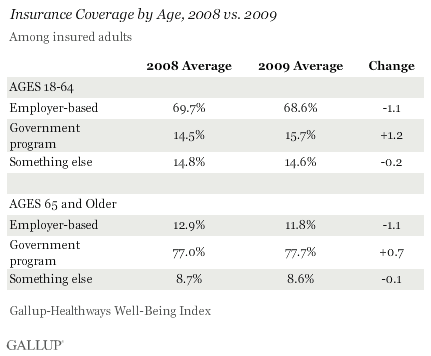
In addition to age, there are differences in reliance on government health insurance by several other demographic groups. Insured Americans who have annual incomes of less than $30,000 are among the most likely to say their primary health coverage is through Medicare, Medicaid, or military/veterans' benefits (46%). At the other end of the spectrum are those people who make $90,000 or more per year, 12.4% of whom report getting coverage through a government plan. When it comes to employer-based health insurance, 75.5% of higher income Americans and 36.7% of lower income Americans report they are covered through their employer or union.
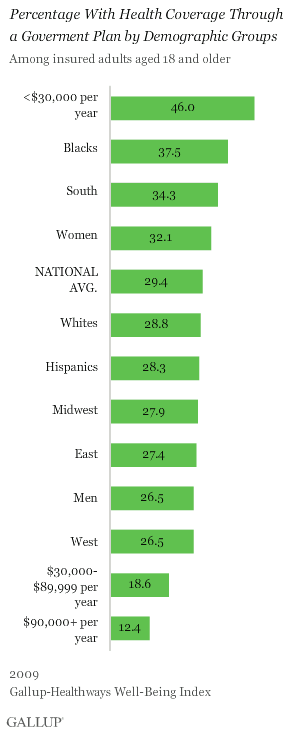
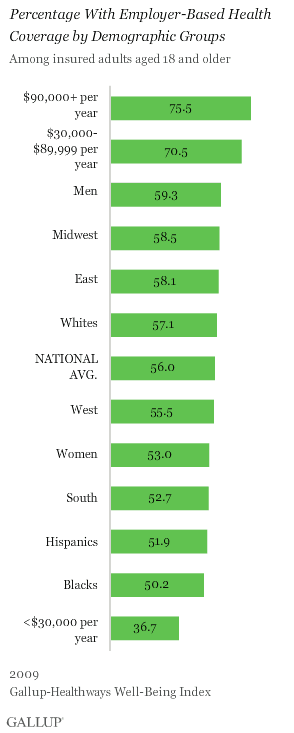
Bottom Line
In his State of the Union address, President Obama said he took on healthcare reform to help the middle class and those Americans who are struggling to get coverage as well as to reduce costs. The president claimed healthcare reform could reduce the federal deficit by as much $1 trillion over the next decade, an important selling point considering that the increasing number of citizens reliant on some form of government health insurance could put additional budget strain on the federal government. The Gallup data emphasize the extent to which the health insurance landscape can change in a relatively short period of time with more Americans relying on government care and fewer getting coverage through their employer from 2008 to 2009.
Learn more about the Gallup-Healthways Well-Being Index.
Survey Methods
For the Gallup-Healthways Well-Being Index, Gallup is interviewing no fewer than 1,000 U.S. adults nationwide 350 days per year. All monthly samples are near 30,000 per month. For monthly results based on the total sample of national adults, one can say with 95% confidence that the maximum margin of error is ±1 percentage point.
Interviews are conducted with respondents on landline telephones and cellular phones.
In addition to sampling error, question wording and practical difficulties in conducting surveys can introduce error or bias into the findings of public opinion polls.
About the Gallup-Healthways Well-Being Index™
The Gallup-Healthways Well-Being Index measures the daily pulse of U.S. wellbeing and provides best-in-class solutions for a healthier world. To learn more, please visit well-beingindex.com.
